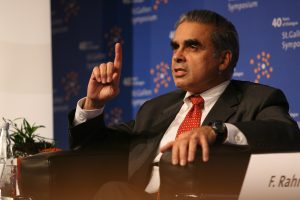“I took to the U.N. like a fish to water.”
As Singapore’s envoy to the United Nations in the 1980s, Kishore Mahbubani made it a point to connect socially with fellow diplomats in New York. Israel’s representative, Benjamin Netanyahu, was a dinner guest. Zuhdi Labib Terzi, the first Palestinian ambassador to the U.N., was “a friend of mine.”
In his recently published memoir, “Living the Asian Century,” the former diplomat writes that personal connections forged during his time at the U.N. helped advance Singapore’s foreign policy goals. According to Mahbubani, Terzi was instrumental in getting the Palestine Liberation Organization to adopt a neutral stance when the city-state invited the president of Israel for an official visit in 1986. The decision had ignited public protests in Malaysia and Indonesia.
Singapore is a “small fish in the dangerous ocean.” Mahbubani adopted a “hard-nosed realist” worldview midway into this career when he interacted closely with three foreign policy stalwarts: Lee Kuan Yew, the country’s first prime minister, Deputy Prime Minister Goh Keng Swee, and S. Rajaratnam, the first foreign minister. When Singapore gained independence from Malaysia in 1965, the first generation of leaders hoped to carve out “geopolitical space” for the island nation.
Mending relations with Malaysia was a priority. Mahbubani was posted to Kuala Lumpur in the 1970s and describes the bilateral dynamic in colorful terms: “Our two nations were like a couple who had married. . . then had a bitter separation. . . But . . . continued living in the same home, side by side.”
The author was an official notetaker at a dinner organized by Singapore’s high commissioner in Kuala Lumpur to defuse tensions between Lee Kuan Yew and Malaysia’s then Deputy Prime Minister Mahathir Mohamad. The two leaders were political rivals in the early 1960s and had a contentious relationship. But at the meeting, Lee Kuan Yew “decided to unleash his full charm,” and Mahathir responded positively. The informal meeting laid the foundation for a working relationship with Mahathir, who eventually became Malaysia’s longest-serving prime minister.
Small states, Mahbubani concludes, rely heavily on support from multilateral institutions. At the U.N., he collaborated with diplomats from other Association of Southeast Asian Nations (ASEAN) countries when Vietnam invaded Cambodia in late 1978 and toppled the government of Pol Pot. The occupation also brought an end to the mass killings by the country’s communist party, the Khmer Rouge.
However, ASEAN viewed the invasion as a breach of international law. “We had a common mission of increasing votes in the UNGA for the ASEAN resolution condemning the Vietnamese occupation of Cambodia, we came together like comrades in arms,” reminisced the author. One of the tactics that ASEAN ambassadors employed was to have Mahbubani deliver lengthy, extempore speeches at the podium while waiting for supporters of the resolution to take their seats.
The book lives up to its subtitle, “an undiplomatic memoir.” Among the candid asides: “When I was in KL, the U.S. Embassy’s Fourth of July receptions would always have the glitziest turnout. Now, I’m told, the Chinese Embassy receptions often draw bigger crowds.” A Wall Street Journal reviewer commented that the memoir appears “untouched by an editor.”
One of the more intriguing geopolitical stories in the book takes place outside Southeast Asia. In the opening chapter, Mahbubani describes his family’s traumatic escape from Sindh. After the partition of British India in 1947, the majority-Muslim region joined Pakistan. The author’s mother and sister fled on a train bound for India as mass killings ensued on both sides of the border. “It was a close shave,” writes Mahbubani.
The family moved overseas to join the author’s father, who worked as a peon in a textile shop. Mahbubani tells the reader: “the first stroke of good luck in my life was to be born in Singapore.” His childhood, however, was marred by poverty and violence. His father battled alcoholism, and his mother struggled to put food on the table.
Janki Mahbubani advised young Kishore to stay positive in the face of adversity, saying: “put butter on your lips and smile.”

































